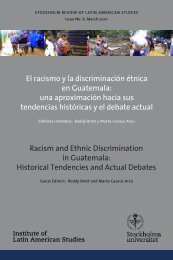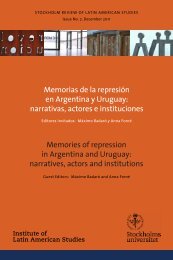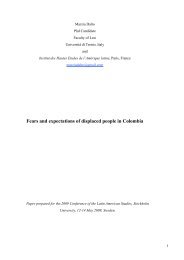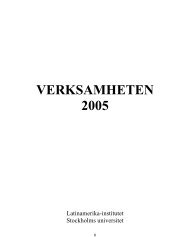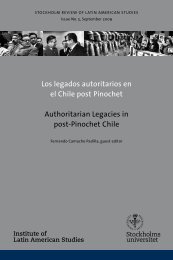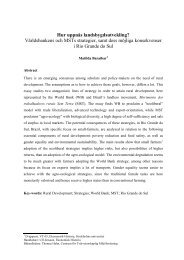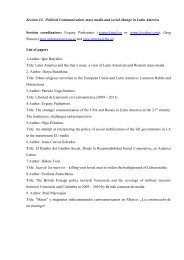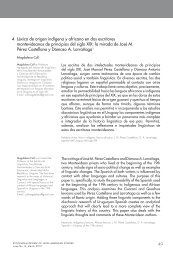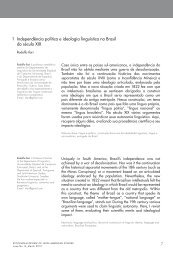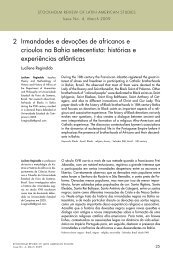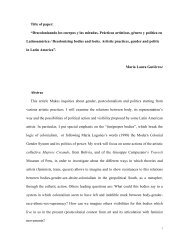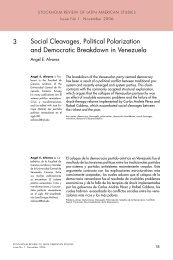Venezuelan Politics and Society in Times of Chavismo PolÃtica y ...
Venezuelan Politics and Society in Times of Chavismo PolÃtica y ...
Venezuelan Politics and Society in Times of Chavismo PolÃtica y ...
You also want an ePaper? Increase the reach of your titles
YUMPU automatically turns print PDFs into web optimized ePapers that Google loves.
Has <strong>Venezuelan</strong> Decentralization Sur vived <strong>Chavismo</strong><br />
Rickard O. Lal<strong>and</strong>er<br />
<strong>of</strong> the government can be <strong>in</strong>terpreted as a re-centralization<br />
<strong>of</strong> State power, <strong>and</strong> thus a cont<strong>in</strong>uation<br />
<strong>and</strong> deepen<strong>in</strong>g <strong>of</strong> the centralist tradition. In Lat<strong>in</strong><br />
American delegative democracies, a common phenomenon<br />
<strong>in</strong> the decision-mak<strong>in</strong>g <strong>and</strong> legislative<br />
processes has been that <strong>of</strong> decretismo, that is, the<br />
president passes laws by decree (O’Donnell, 1994:<br />
66-67) – <strong>in</strong> Venezuela a heavy presidential tradition,<br />
particularly s<strong>in</strong>ce the first government <strong>of</strong> Carlos<br />
Andrés Pérez <strong>in</strong> 1974-78. Most probably, this<br />
system constitutes an obstacle to efficient <strong>and</strong> effective<br />
decentralization <strong>and</strong> to the possibilities for<br />
local <strong>and</strong> regional political leaders to do politics.<br />
Deconcentration or decentralization<br />
From certa<strong>in</strong> perspectives, the populism <strong>and</strong> power<br />
concentration <strong>of</strong> Chávez constitutes a source <strong>of</strong><br />
conflict for the democratization pr<strong>in</strong>ciples <strong>of</strong> decentralization.<br />
But at the grassroots level, MVR <strong>and</strong><br />
<strong>Chavismo</strong> <strong>in</strong>troduced a counter-movement (years<br />
before Chávez came to power), “the Bolivarian Circles”<br />
(Círculos Bolivarianos), aga<strong>in</strong>st the traditional<br />
political parties <strong>and</strong> civil society organizations. 7<br />
Every little group at base level should be able to<br />
form a circle, as Chávez puts it, every fish<strong>in</strong>g boat,<br />
every neighborhood block should get together <strong>and</strong><br />
discuss politics <strong>in</strong> the Bolivarian spirit. For this purpose,<br />
local assemblies were organized. The militants<br />
<strong>of</strong> MBR-200 8 sought to tra<strong>in</strong> the circle members<br />
with study courses <strong>in</strong> national <strong>and</strong> <strong>in</strong>ternational<br />
history. The idea was that frequent discussions on<br />
politics would help to overcome difficulties related<br />
to political <strong>in</strong>experience <strong>and</strong> military rigidity. But<br />
conflicts emerged frequently between civilians <strong>and</strong><br />
military people, on political leadership style, for<br />
<strong>in</strong>stance. In an <strong>in</strong>terview made <strong>in</strong> 2002, President<br />
Chávez expresses his view on decentralization <strong>and</strong><br />
its relationships with the national political plans:<br />
A contradiction is produced <strong>and</strong> it is necessary to look<br />
for a solution, <strong>and</strong> the only possible one is established<br />
<strong>in</strong> our Constitution, or at least one <strong>of</strong> the solutions.<br />
That is democratic, participatory plann<strong>in</strong>g <strong>and</strong> open<br />
discussion. They have accused us <strong>of</strong> be<strong>in</strong>g enemies <strong>of</strong><br />
[de] centralization,* but really we are not, but <strong>in</strong>deed<br />
we are aga<strong>in</strong>st the dis<strong>in</strong>tegrat<strong>in</strong>g decentralization. One<br />
<strong>of</strong> the five strategic axes <strong>of</strong> the national development<br />
project is precisely the deconcentrated decentralization.<br />
That is, we add the word deconcentrated to the<br />
concept <strong>of</strong> decentralization with<strong>in</strong> the federal model<br />
(Chávez, <strong>in</strong> Harnecker, 2002: 55).<br />
Now, decentralization can be related theoretically<br />
<strong>and</strong> conceptually to deconcentration, s<strong>in</strong>ce both<br />
systems refer to a transfer <strong>of</strong> powers (e.g., from national<br />
to regional or local level). However, deconcentration<br />
concerns the process through which<br />
the national central government is present <strong>in</strong> local<br />
<strong>and</strong>/or regional entities. Decentralization, on the<br />
other h<strong>and</strong>, refers to the transfer <strong>of</strong> services, competencies<br />
<strong>and</strong> resources from the central, national<br />
government to the local communities <strong>and</strong>/or the<br />
regions. Delegation, sometimes also confused with<br />
decentralization, can be def<strong>in</strong>ed as the time-limited<br />
assignation <strong>of</strong> functions to an entity hav<strong>in</strong>g a different<br />
juridical nature. The signification <strong>of</strong> decentralization<br />
is <strong>of</strong>ten better understood <strong>in</strong> a comparison<br />
with its´ opposite: centralization. Decentralization<br />
can be perceived as the antithesis <strong>of</strong> centralization,<br />
but practically speak<strong>in</strong>g, probably neither a totally<br />
centralized nor a totally decentralized system would<br />
function, at least not well enough to deserve to be<br />
7 For an <strong>of</strong>ficial presentation <strong>of</strong> the Bolivarian Circles, see:<br />
www.circulosbolivarianos.org. Anti-chavistas have re<br />
named these organizaations the “Terror Circles” (Círculos de<br />
Terrór), claim<strong>in</strong>g that the circles are provided with arms by<br />
the government for military preparedness purposes. These ac<br />
cusations are firmly rejected by both Chávez <strong>and</strong> the circles<br />
at the grassroots level.<br />
8 The Revolutionary Bolivarian Movement-200, MBR-200<br />
(Movimiento Bolivariano Revolucionario –200) was formed<br />
as a civicmilitary movement <strong>in</strong> 1983 by Hugo Chávez <strong>and</strong><br />
other midlevel military men, <strong>and</strong> the name alludes to the<br />
200th anniversary <strong>of</strong> the birth <strong>of</strong> Liberator Simón Bolívar.<br />
The political approach <strong>of</strong> MBR-200 can be described as<br />
nationalist <strong>and</strong> populist <strong>in</strong> its anti-establishment strategies.<br />
Officially the program <strong>of</strong> the movement is based on ”Bolivarianism”<br />
(the ideas <strong>of</strong> Bolívar). To be able to compete <strong>in</strong> the<br />
elections <strong>of</strong> 1997, MBR-200 registered as a political party<br />
<strong>in</strong> 1997, under the name <strong>of</strong> Movimiento Qu<strong>in</strong>ta República<br />
(MVR), although MBR-200 has rema<strong>in</strong>ed as an <strong>in</strong>ternal<br />
group with<strong>in</strong> MVR.<br />
* A typ<strong>in</strong>g or transcription error appears <strong>in</strong> the material <strong>of</strong><br />
Harnecker. It is obvious that Chávez is speak<strong>in</strong>g about<br />
decentralization <strong>and</strong> not centralization.<br />
Stockholm REVIEW OF Lat<strong>in</strong> American Studies<br />
Issue No 1. November 2006<br />
36



